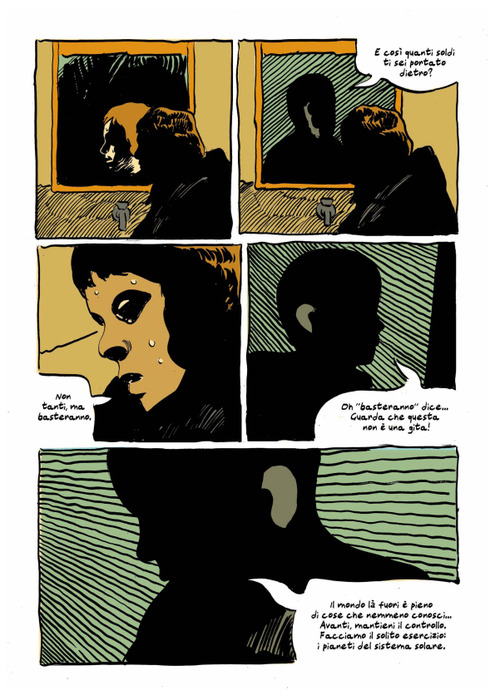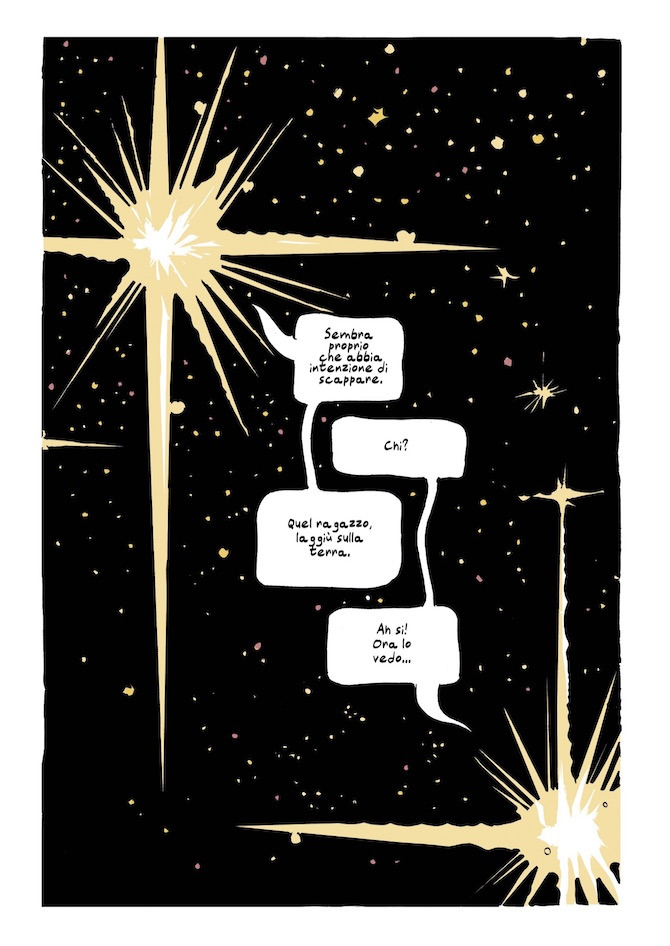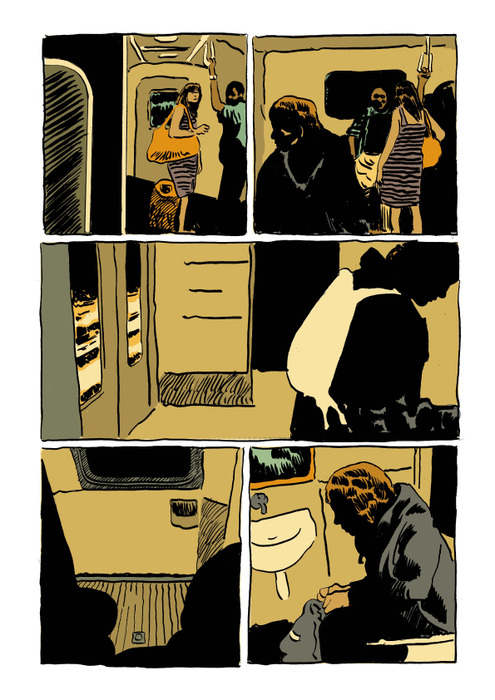Marino Neri presents us with a, at one time, laconic and loquacious book. This is the story of a young boy named Cosimo, whose interest in stars grant him the nickname Cosmo. The book starts with Cosimo running away from a social services building, and entering a dangerous, night-time journey across the country. It is not clear if he has a specific place to reach, but his purpose seems to be to be as distant as possible from the place he ran away from, in order to be closer to something else.
We will never learn anything about the place Cosimo fled, and little about the place where he runs to. Neri introduces several themes throughout the book, as the chapter pages and other sections of the book integrate snippets of information that seemed as if from the pages of an encyclopedia into the narrative. One such theme is that of universal expansion, the fact that the stars are continuing their big bang trajectory and that, eventually, there will be no light in the heavens. Contact, touch, communication, companionship, become, therefore, the principal notes of this nocturne.

Cosimo does not speak, or at least not often, and he hates to be touched. We have access to his thoughts, and the very little pieces of information about his life, through captions, but he rarely uses speech balloons. When he does, speaking to a young girl he meets when hiding inside her wardrobe, he seems to spew things he has memorized from an encyclopedia. Moreover, Cosimo shows us that he is in constant contact with the “ragazzo ombra”, a sort of shadow companion, somewhat reminiscent, if obliquely, of Peter Pan’s shadow (and many other narratives about characters living with separate shadows or without them, as the case of Peter Schmelihl). The “shadow” speaks often, explaining things to Cosimo, engaging him in mind exercises, goading him to the journey, with the seemingly impossible endpoint being the Chilean Atacama desert, where the largest telescope of the world is found…

The fantastic, in its Todorovian sense, is present, as the “shadow companion” of Cosimo gains life when addressing him, but never materializing when in the presence of others. The reader may feel that such a character is either a figment of Cosimo’s imagination, a reflection of hypothetical autism, or an actual embodiment of an otherworldly entity. After all, Cosmo is book-ended by the speech of stars, who discuss the little boy’s life. It’s as if Neri is interested in showing how cosmic connections are not only true in a physical sense – the famous Carl Sagan sentence that we made of “star stuff” seems to be an yet another unspoken theme of the book – but also in a more personal way.
Neri hints, sometimes not that subtly, about how such a journey came to be. A brief discussion about monarch butterflies and their wonderful travel across the North American continent through several generations creates a metaphorical link to Cosimo’s own “internal compass” that makes him undergo his peculiar path. When he arrives at the car graveyard in the end of the book, he meets an old blind man, who lives surrounded by dozens of feral cats. The man claims to he his father, but there is no definitive piece of information that would aid us confirm this claim, and neither are Cosimo’s reactions helpful in any way. Unreliability remains the rule of the communication throughout the book.
One could perhaps create a parallel between Cosmo and the original Pinocchio. Both are dark narratives about a child-character journeying through dangerous places and meeting up dangerous characters (Cosimo is threatened by two rural hunters). Both have father figures that are protective but somewhat powerless. Both are accompanied by fantastical characters that might as well be their consciences. Both have entities that shine and protect them in some way: Pinocchio has his blue fairy, Cosimo, the stars. But whereas Collodi’s classic, despite its dark undertones, fulfills the role of most children’s literature, Cosmo is a contemporary novel where ambiguity rules. Does it have a “happy end” or an “open” one? Perhaps we could say that that depends on the reader. Loneliness seems to be something impossible to evade completely. Cosimo travels between several types of loneliness.

The composition of the pages is rather simple, and classic, and the coloring is subdued with ochre and earthly reds, greens, greys and yellows, almost as if the author wanted to counterbalance the cosmic themes with a, well, grounded approach. Cosmo is a book that is not built to savour quickly in search of a punchline or resolution, but rather to sip slowly and try to unlock Cosimo’s unspoken emotions and reactions to the word around him. A world that he seems to want to embrace, at the same time he flees from it.
A thank you note to F. A. for lending me his copy.


I was curious if you ever thought of changing the page layout of your blog? Its very well written; I love what youve got to say. But maybe you could a little more in the way of content so people could connect with it better. Youve got an awful lot of text for only having one or 2 pictures. Maybe you could space it out better?
GostarGostar
Dear friend,
Thank you so very much for your kind words. English is not my native language, so I hope the texts are at least readable. I am not that much proficient in blog design but will try my best in following your advices: more description/synopsis and more pictures. I have made many changes throughout the years on my Portuguese-language blog, but this is new… Thank you!
PM
GostarGostar